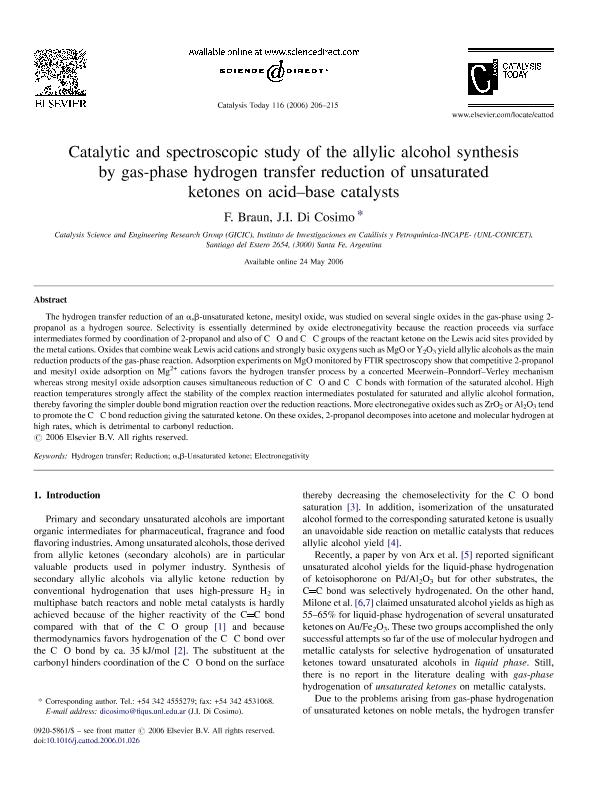Mostrar el registro sencillo del ítem
dc.contributor.author
Braun, Fernando

dc.contributor.author
Di Cosimo, Juana Isabel

dc.date.available
2018-11-27T16:16:19Z
dc.date.issued
2006-08
dc.identifier.citation
Braun, Fernando; Di Cosimo, Juana Isabel; Catalytic and spectroscopic study of the allylic alcohol synthesis by gas-phase hydrogen transfer reduction of unsaturated ketones on acid-base catalysts; Elsevier Science; Catalysis Today; 116; 2 SPEC. ISS.; 8-2006; 206-215
dc.identifier.issn
0920-5861
dc.identifier.uri
http://hdl.handle.net/11336/65316
dc.description.abstract
The hydrogen transfer reduction of an α,β-unsaturated ketone, mesityl oxide, was studied on several single oxides in the gas-phase using 2-propanol as a hydrogen source. Selectivity is essentially determined by oxide electronegativity because the reaction proceeds via surface intermediates formed by coordination of 2-propanol and also of C{double bond, long}O and C{double bond, long}C groups of the reactant ketone on the Lewis acid sites provided by the metal cations. Oxides that combine weak Lewis acid cations and strongly basic oxygens such as MgO or Y2O3 yield allylic alcohols as the main reduction products of the gas-phase reaction. Adsorption experiments on MgO monitored by FTIR spectroscopy show that competitive 2-propanol and mesityl oxide adsorption on Mg2+ cations favors the hydrogen transfer process by a concerted Meerwein-Ponndorf-Verley mechanism whereas strong mesityl oxide adsorption causes simultaneous reduction of C{double bond, long}O and C{double bond, long}C bonds with formation of the saturated alcohol. High reaction temperatures strongly affect the stability of the complex reaction intermediates postulated for saturated and allylic alcohol formation, thereby favoring the simpler double bond migration reaction over the reduction reactions. More electronegative oxides such as ZrO2 or Al2O3 tend to promote the C{double bond, long}C bond reduction giving the saturated ketone. On these oxides, 2-propanol decomposes into acetone and molecular hydrogen at high rates, which is detrimental to carbonyl reduction.
dc.format
application/pdf
dc.language.iso
eng
dc.publisher
Elsevier Science

dc.rights
info:eu-repo/semantics/openAccess
dc.rights.uri
https://creativecommons.org/licenses/by-nc-sa/2.5/ar/
dc.subject
Hydrogen Transfer
dc.subject
Reduction
dc.subject
Alpha,Beta-Unsaturated Ketone
dc.subject
Electronegativity
dc.subject.classification
Otras Ingeniería Química

dc.subject.classification
Ingeniería Química

dc.subject.classification
INGENIERÍAS Y TECNOLOGÍAS

dc.title
Catalytic and spectroscopic study of the allylic alcohol synthesis by gas-phase hydrogen transfer reduction of unsaturated ketones on acid-base catalysts
dc.type
info:eu-repo/semantics/article
dc.type
info:ar-repo/semantics/artículo
dc.type
info:eu-repo/semantics/publishedVersion
dc.date.updated
2018-11-22T14:26:21Z
dc.journal.volume
116
dc.journal.number
2 SPEC. ISS.
dc.journal.pagination
206-215
dc.journal.pais
Países Bajos

dc.journal.ciudad
Amsterdam
dc.description.fil
Fil: Braun, Fernando. Consejo Nacional de Investigaciones Científicas y Técnicas. Centro Científico Tecnológico Conicet - Santa Fe. Instituto de Investigaciones en Catálisis y Petroquímica "Ing. José Miguel Parera". Universidad Nacional del Litoral. Instituto de Investigaciones en Catálisis y Petroquímica "Ing. José Miguel Parera"; Argentina
dc.description.fil
Fil: Di Cosimo, Juana Isabel. Consejo Nacional de Investigaciones Científicas y Técnicas. Centro Científico Tecnológico Conicet - Santa Fe. Instituto de Investigaciones en Catálisis y Petroquímica "Ing. José Miguel Parera". Universidad Nacional del Litoral. Instituto de Investigaciones en Catálisis y Petroquímica "Ing. José Miguel Parera"; Argentina
dc.journal.title
Catalysis Today

dc.relation.alternativeid
info:eu-repo/semantics/altIdentifier/doi/http://dx.doi.org/10.1016/j.cattod.2006.01.026
Archivos asociados
